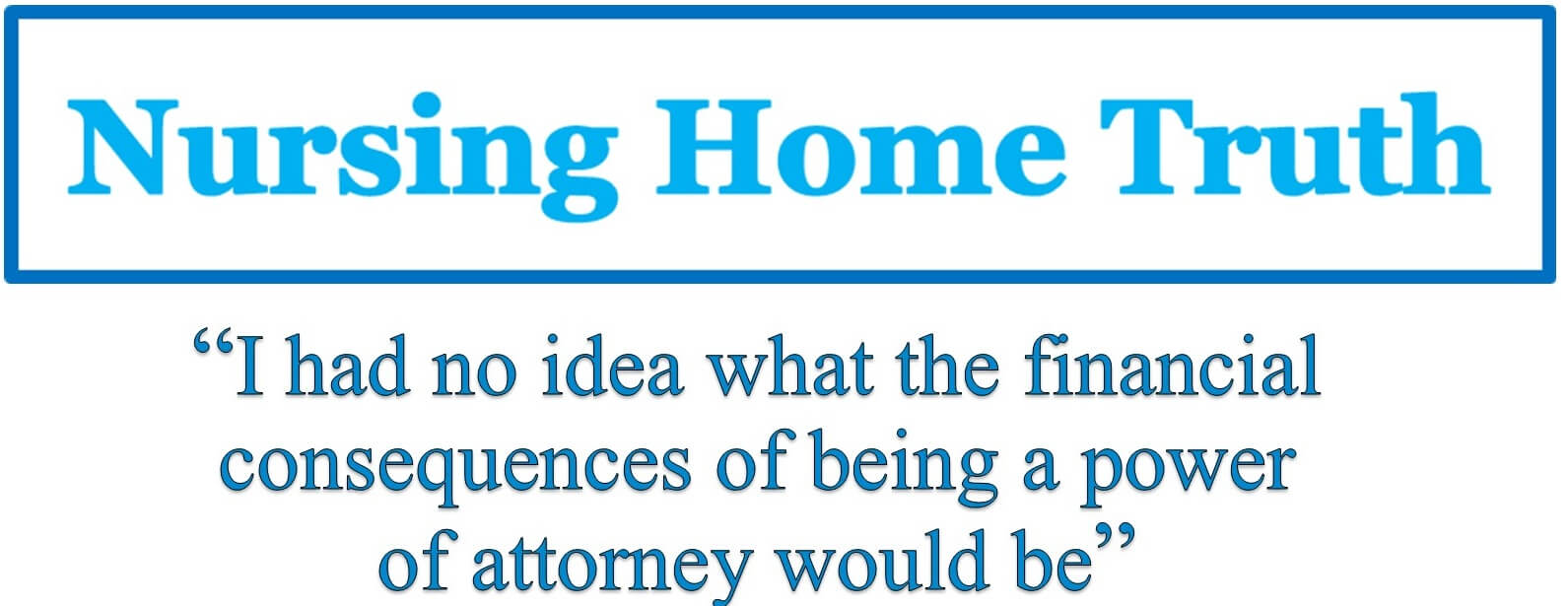Article Updated: January 17, 2022
Power of Attorney’s Responsibility for Nursing Home Bills
In this article you will learn the law as it relates to a power of attorney’s responsibility for nursing home bills.
The thing that shocks me is that, despite this law, clients sometimes reach out to me panicking that a nursing home is chasing them down for their elderly love ones’ medical bills.
This deceitful practice has to end. I hope that this article helps you fulfill that objective.
If you need help beyond this issue, and need help investigating a case of nursing home abuse, please send me an email or submit the contact form below. I live and breath nursing home advocacy, and speaking with me is 100% FREE.
Clickable Table of Contents
Nursing Home Bills Issues
1 – Logistics of Nursing Home Bills
2 – Is Power of Attorney Responsible for Nursing Home Bills
3 – Protecting a Power of Attorney from Nursing Home Bills & Debt
4 – Help for Power of Attorneys with Nursing Home Bills
Resources
5 – Supporting Literature, Citations & Research
6 – About the Author
7 – Legal Help in Maryland & Nationally
Logistics of Nursing Home Bills
The process of putting a loved one into a care home is not only emotionally difficult, but also logistically difficult. Where do you start? Who pays for the bills? Is the power of attorney responsible for nursing home bills?

Step By Step Norms in Nursing Home Billing
Nursing homes generally bill residents or those who control the residents accounts on a monthly basis for their care.
When you initially sign up for a care home, you will have a contract that lays out the rules of your specific costs and payment plan rules and expectations.
Variables like level of care, whether or not there is a private room and so on, will all be calculated in the contract.
The billing period may be prorated depending on when you enter into the facility and also may pre-bill for the upcoming month as well. Taxes, depending on the state, may also be added to the full monthly bill.
Nursing Home bills Allocation
Whatever health insurance the nursing home resident has, including Medicare, Medicaid, long-term care insurance and private health insurance, will be applied to the bill each month.
Any amount left over after these deductions are the balance owed by the nursing home resident, and allocated as self-pay amounts that are due by that patient.
This information helps to make a lot of the billing logistics clear, but it leaves open the question of whether or not the power of attorney is responsible for nursing home bills.
Is Power of Attorney Responsible for Nursing Home Bills
So, is a power of attorney responsible for nursing home bills? No, there should not be any belief on your part that, as a power of attorney, you are personally responsible for paying medical bills for the person you are representing.
This does not mean you are in the clear, because you have to understand that contracts, fine print and lack of understanding, can make you feel like you are responsible.
What Is the Power of Attorney?
The power of attorney is responsible for taking care of the logistics of bill payment. This is a person who therefore is helping to conduct the physical tasks of the resident’s normal day to day functions and the decision making process.
The power of attorney is not signing on to take liability for the individuals life and outcomes, but rather is helping the nursing home resident make decisions and take actions because that elderly person can no longer do this on their own.
For nursing home bills, this means that the power of attorney is paying bills by signing over checks, signing contracts and more, on behalf, and from the resources, of the person who will be in the care home.
Legal Protection For You
Legally, the nursing home cannot ask you to personally take on the bills or deny entrance if you refuse to accept personal financial liability.
Per federal laws that protect you under Title 42 of the Code of Federal Regulations, section 483.15(a)(3), this is not allowed.
Personal Funds Versus Resident’s Funds
The nursing home can in some cases ask the power of attorney to take on the nursing home bills but not how you think.
When the nursing home has you accept liability for nursing home bills, they are ensuring that you are liable to use the resident’s own funds to pay the bills which you have control over as the power of attorney, not to pay the bills with your own personal funds.
Therefore, assuming you have not signed a contract specifically taking on personal liability for nursing home bills, as the power of attorney you are not personally liable even if the resident is your own family member.
Nursing Home Fine Print
This does not mean that nursing homes will not try to sneak in fine print that is worded in a confusing manner to try and rope you into taking on that very personal liability that you have a right to avoid.
If you sign on as a personal financially responsible person for the bills because your contract states that, you will find yourself in a tough situation where the nursing home will claim that you have personally accepted this liability.
Just because you did sign this, does not mean you cannot get it reconsidered, but you will need the help of legal counsel in this case as the nursing home is not likely to simply let you walk away from a contract because you don’t want to pay.
Protecting a Power of Attorney from Nursing Home Bills & Debt
Thus, the real question does not center on whether the power of attorney responsible for nursing home bills, but really more about how to protect yourself from being cornered into taking on these bills.
You are protected, as noted above, under Title 42 of the Code of Federal Regulations, section 483.15(a)(3). That law states these bills are not your personal liability to pay. As the power of attorney, these nursing home bills need not be paid from your private funds.
This protection should offer you the confidence and support you need to sign contracts that are in your favor.
Additional protection should be sought out with you reading and understanding all the fine print in your contract with the nursing home to make sure they are not attempting to subvert your role as a power of attorney to bend to their own preference to hold you liable for the nursing home bills.
Help for Power of Attorneys with Nursing Home Bills
As unbelievable as it sounds, I currently have multiple nursing home abuse clients (who were the power of attorneys for their family in a nursing home) where the nursing home killed their loved ones, and is now sending the grieving family members medical bills.
This is one of those “you can’t make this kind of thing up” type of scenario. If a nursing home is pulling this move on you, you need professional, legal help.
I am in Baltimore, Maryland, but even if you are not in Baltimore I invite you to call me for help. I take great pleasure in bringing terrible nursing homes to the realities of justice.
You can email me, or fill out the contact form below to recruit my help.
Warmly,
Reza Davani, Esq.
State Bar No.: #1212110211
Federal Bar No.: #30168
Cellphone: (301) 922-4598
Email: reza@nursinghometruth.com

Supporting Literature, Citations & Resources:
Ouslander, J. G., & Berenson, R. A. (2011). Reducing unnecessary hospitalizations of nursing home residents. The New England journal of medicine, 365(13), 1165.
Ness, J., Ahmed, A., & Aronow, W. S. (2004). Demographics and payment characteristics of nursing home residents in the United States: a 23-year trend. The Journals of Gerontology Series A: Biological Sciences and Medical Sciences, 59(11), 1213-1217.
Hendricks, A., Whitford, J., & Nugent, G. (2003). What would VA nursing home care cost? Methods for estimating private sector payments. Medical care, II52-II60.
Rhoades, J. A. (2018). The nursing home market: Supply and demand for the elderly. Routledge.
Kaye, H. S., Harrington, C., & LaPlante, M. P. (2010). Long-term care: Who gets it, who provides it, who pays, and how much? Health affairs, 29(1), 11-21.
LLI. 42 CFR § 483.15
McMillan, J. (2017). Risk: Making enduring powers of attorney: Practical tips. LSJ: Law Society of NSW Journal, (35), 80-81.
About the Author
This nursing home and medical malpractice article was written by Baltimore, Maryland nursing home attorney Reza Davani, Esquire. Mr. Davani received his Juris Doctor degree from a Tier 1 law school, the University of Maryland Francs King Carey School of Law. He received his first license to practice law from the State of Maryland’s Court of Appeals (MD State License No. 1212110211), and just four months later received a federal law license from the United States District Court for the District of Maryland (Federal License No. 30168).
Mr. Davani has been practicing law for over 10 years. He began practicing law by helping clients as a sanctioned student lawyer before receiving his law license, and second chaired his first jury trial in federal court before even graduating law school. He is a registered member of the Maryland Association for Justice (MAJ), the American Bar Association (ABA), the American Association for Justice (AAJ), and was formerly on the MAJ’s Legislative Leader’s Circle.
Mr. Davani has taken over 20 cases to trial in state and federal court, and favorably settled well over 100 cases for injured victims. He has personally helped his clients recover over $15,000,000 in personal injury, medical malpractice, and nursing home abuse settlements and verdicts in Maryland and other states. He is dedicated to fighting for justice, and welcomes the opportunity to help you.
Nursing Home Abuse Lawyer Near You in Maryland & Beyond
I can help you anywhere in Maryland, including Allegany County, Anne Arundel County, Baltimore City, Baltimore County, Carroll County, Calvert County, Caroline County, Cecil County, Charles County, Dorchester County, Frederick County, Garrett County, Harford County, Howard County, Kent County, Montgomery County, Prince George’s County, Queen Anne’s County, Somerset County, St. Mary’s County, Talbot County, Washington County, Wicomico County, and Worcester County.
I have helped clients in over a dozen jurisdictions, including California, Delaware, District of Columbia, Georgia, Illinois, Iowa, Massachusetts, Maryland, Mississippi, New Jersey, New Mexico, New York, North Carolina, Pennsylvania, South Carolina, Washington, and Virginia.
I help injured victims nationwide in all 50 states on a case-by-case basis via Pro Hac Vice.










